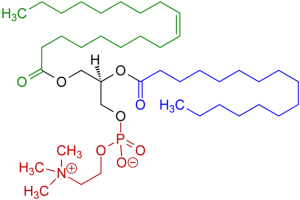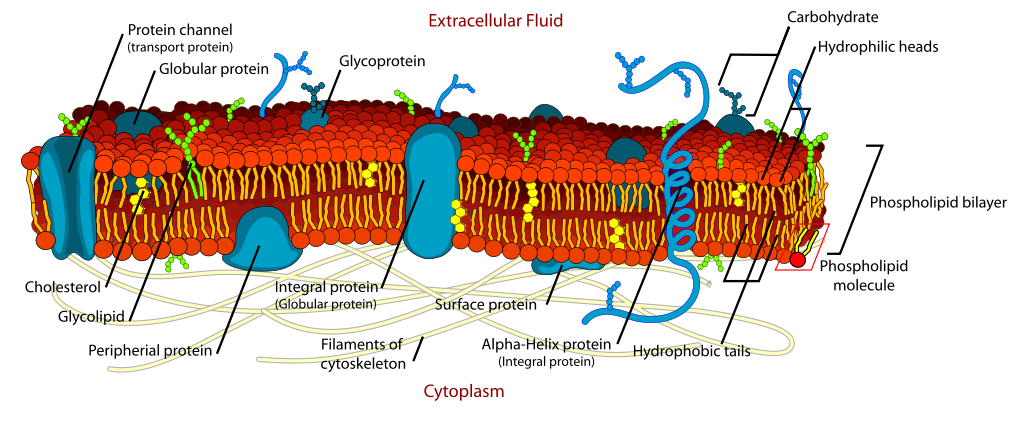Natural compound phosphatidylcholine may improve memory, especially in the context of age-related cognitive decline.

- Enhance levels of acetylcholine, a neurotransmitter strongly involved in memory function.
- Support brain cell health. Phosphatidylcholine is a major brain cell membrane component, and its levels may decline with age.
Overview
Phosphatidylcholine (PC) is a naturally occurring phospholipid found in the membranes of all cells, and is also present in foods like eggs, soybeans, sunflower seeds, and liver.
Phospholipids are compounds made of lipids (fatty acids), phosphates, and choline – an essential nutrient that the body uses to syntesize acetylcholine, a neurotransmitter particularly associated with memory. Phosphatidylcholine is the most common dietary form of choline. As a supplement, it is advertised to support the liver, cognitive function, and overall health.
Although some clinical studies have reported positive results in standard memory tests and cognitive assessments using PC, it has not been proven effective in the treatment of Alzheimer’s or other neurodegenerative disorders. 1

How Phosphatidylcholine Might Help the Brain
Increasing acetylcholine levels
Acetylcholine is a neurotransmitter best known for playing an important role in memory, and its dysfunction has been linked to age-related memory impairment. 2
Phosphatidylcholine may be able to raise acetylcholine concentrations in the brain by supplying the choline needed for its synthesis. 3 This biological activity could be one of the main reasons phosphatidylcholine has been found to improve memory function, particularly in older and demented animals.
Keeping brain cell membranes healthy
Phosphatidylcholine is the most abundant of the four phospholipids that link together to form cell membranes – the semipermeable, protective layer separating the interior of cells from their outside environment. Cell membranes are critically important to life; while a cell can still function if its other components are damaged, if the membrane is damaged the entire cell dies instantaneously. 4
Phosphatidylcholine production has been suggested to decline with age, which may hinder neuron function and be involved in age-related cognitive decline. As such, increasing phosphatidylcholine consumption through diet or supplementation may he helpful.
Phosphatidylcholine’s Proposed Uses
As a nootropic, phosphatidylcholine is claimed to support cognitive function and memory in particular. There is some research evidence to back phosphatidylcholine’s positive effect on memory. However, most of these studies are limited to animals, and there is little data on its effects in healthy individuals.
It seems that other choline supplements — particularly alpha GPC and lecithin — are more popular because they have seen more research and are more commonly used in clinical practice.
Research
Animal Research
Phosphatidylcholine has seen a good amount of research in animals. Specific findings include:
- Increased brain acetylcholine levels and improved memory in mice with dementia5 6
- Amelioration of stress-induced depression-related behaviors and memory impairment in mice7
- Improved maze-learning ability in older mice given egg-derived phosphatidylcholine8
- Improved memory in older mice given the phosphatidylcholine precursor CDP-choline daily for 1-2 years9
Human Research
Human research of phosphatidylcholine is scarce, mostly because other choline sources such as alpha GPC are considered superior.
DL-/PO-phosphatidylcholine may improve long-term memory
This study tested the memory effects of the DL and PO-phosphatidylcholine formulations in healthy subjects. Thirty-four people were given DL-PC (50 mg/d) and PC-PC (45 mg/d) or placebo, and had their memory tested by remembering specific words and text, which they had to recall and write down a minute later (short-term test) and a 1 week later (long-term test).
People taking DL-PC and PO-PC had almost three times more correct answers on the long-term memory test than placebo subjects.
- The researchers concluded that “The results of the present study indicate that DL–/PO–PC could enhance long-term memory potential for normal healthy subjects“10
Phosphatidylcholine may improve long-term memory
In this double-blind study, 80 college students were tested to determine the effects of phosphatidylcholine on explicit memory – one of the two major types of long-term memory. Students were given 25 g PC containing 3.75 g choline, and had their memory assessed in a serial learning task 60 and 90 minutes afterwards. Test results showed some memory improvement.
- The researchers concluded that “significant improvement in explicit memory, as measured by a serial learning task, was observed“11
Nootropic Dosage
- When taken orally, up to 60 percent of phosphatidylcholine is absorbed into the intestines before it can enter into the blood stream, making it necessary to take a higher dosage of PC than other choline sources like alpha GPC
- Most successful studies of phosphatidylcholine have used doses as high as 25 g in healthy adults
- Given the small amount of research, it’s best to follow supplement recommendations, which suggest 420 – 840 mg phosphatidylcholine daily
Supplements in Review Says
- Phosphatidylcholine 420 – 840 mg daily.
Phosphatidylcholine may have some memory benefits, but there are more studied alternatives. Given the scarcity of human research data, it’s better to go with more popular and researched choline and phospholipid-containing compounds, such as alpha GPC.
420 mg is the most common supplement dose. If you do want to give phosphatidylcholine a try, most supplements suggest doses of 420 mg taken 1-3 times daily.
References
Hello to supplementsinreview.com.Congrats on your extremely useful site.
I just have a question about sunflower lecithin.It’s known that it contains choline.As choline is not considered to be cycled that means that lecithin doesn’t need to be cycled as well?
I have Sunflower Lecithin (1200mg now foods) which also contains 210mg phosphatidylcholine apart from lecithin.
Hello Kostas, you don’t need to cycle choline since it is a nutrient that we naturally consume anyway, and because a form of it (phosphatidylcholine) is naturally present in our bodies at all times.
Thanks for your answer Gleb.You see, the problem is that after I stopped taking it for 6 days in a row and started again I woke up in the middle of the night after a nigthmare,sweatty..The second time that happened again and I couldn’t fall asleep.
Also, when I don’t take the specific supplements ir stop taking at all I kinda experience slight increase in anxiety.Maybe it’s just my idea, I don’t know.
Could sunflower lecithin in liquid form(now foods) considered a better choice.This product doesn’t contain extra phosphatidyl choline in it.
Here is depicted my log of sunflower lecithin consumpion..
Tuesday=1200mg lecithin
Wednesday=1200mg lecithin
Thursday= –
Friday=,1200mg lecithin
===Saturday=1200mg lecithin
Sunday=1200mglecithin
Monday= –
Tuesday=1200mg lecithin
Wednesday=1200mg lecithin
Thursday=1200mg lecithin
Friday= –
Saturday= –
Sunday= –
Monday= –
Tuesday= –
Wednesday= –
Thursday=lecithin 1200mg(sudden woke up after a nightmare during sleep with sweaty)
Friday=lecithin 1200mg(sudden woke up during sleep with sweat) and I could’t fall asleep
I consume at least 1 whole egg and half glass of milk every day.
I’m not sure. The best place to get an answer would be reddit’s nootropic community. Try to find a post with a similar question or just make one yourself.
Thanks